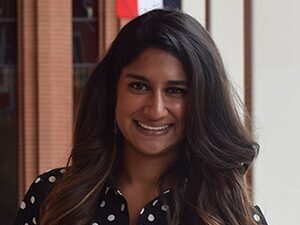Center for Advanced Genocide Research Awards Student Research Fellowship to Nisha Kale
USC junior Nisha Kale combined her dual interests in neuroscience and history to begin work on a multidisciplinary research project as USC Shoah Foundation Center for Advanced Genocide Research’s DEFY Undergraduate Summer Research Fellow.
Kale, a double major in Neuroscience and Law, History and Culture, said she applied to the DEFY Undergraduate Research Fellowship, which provides support for a USC undergraduate to conduct research in the Visual History Archive at USC Shoah Foundation for one month, because it would allow her to combine her admittedly contrasting interests.
“I am interested in how the two fields can relate to each other because I can get a better understanding of both fields from that,” Kale said. “I felt like it was a really unique opportunity to combine my interests in history and psychology and neuroscience.”
For her research at USC Shoah Foundation, she chose to examine genocide survivors’ reactions to stress – not after the genocide, as most similar research focuses on, but actually while the genocide was ongoing. To do so, she watched testimonies from the Holocaust, Rwandan and Armenian collections in the Visual History Archive, looking for interviewees’ descriptions of particularly stressful events such as killings, beatings, forced marches and mass execution survival and how the survivors described reacting to these events as they were happening.
Kale paid particular attention to the differences in men’s and women’s responses to stress. Previous research has suggested that men have a “fight or flight” response to stress while women have a “tend or befriend” response (caring for others and forming social connections to survive). She wanted to see if this held true across the three genocides.
Kale said watching testimony was much more difficult than she thought it would be. Many of the stories, particularly the Rwandan survivors’ experiences, were extremely moving.
“It was very difficult for me to watch some of these testimonies because although I’m trying to look at it from an objective standpoint and look for patterns and trends, these people are still human and I’m still human,” Kale said.
Though Kale’s research is ongoing, she has already made several observations. She found that generally women did tend to have more of a tend/befriend response to genocidal events – mothers protecting their children, for example. She also discovered a phenomenon she hadn’t expected: something she coined “death acceptance.” This is when a survivor seems to have accepted the idea that he or she is going to die and doesn’t display either fight, flight, tend or befriend responses.
“One of the most interesting and transformative things I’ve learned from this experience is that a lot of people don’t have any response at all [to stress],” she said. “I thought that was really interesting and wasn’t something I originally considered. I didn’t realize there was an entirely separate response.”
The context of the genocide is important to consider, Kale said – the Rwandan Tutsi Genocide happened much faster than the Holocaust with not as many chances for resistance, for example, and victims’ religions may affect their acceptance of death. But her theory is that people with higher exposure to death are more accepting of their own mortality.
Kale plans to continue working on her project next year and possibly submit it as an honors thesis or to an academic journal.
Although it was challenging for Kale to watch testimony and discover the experiences survivors went through when they were her age or even younger, she feels it’s important to be a witness to their stories.
“I think that’s important because the Shoah Foundation operates on compassion. Resistance to genocide is based on compassion,” Kale said. “So I think that while it’s really, really difficult to watch the testimonies, I am motivated to do this type of work because I think we can prevent this in the future by watching these people and having compassion for the stories they’re telling.”
